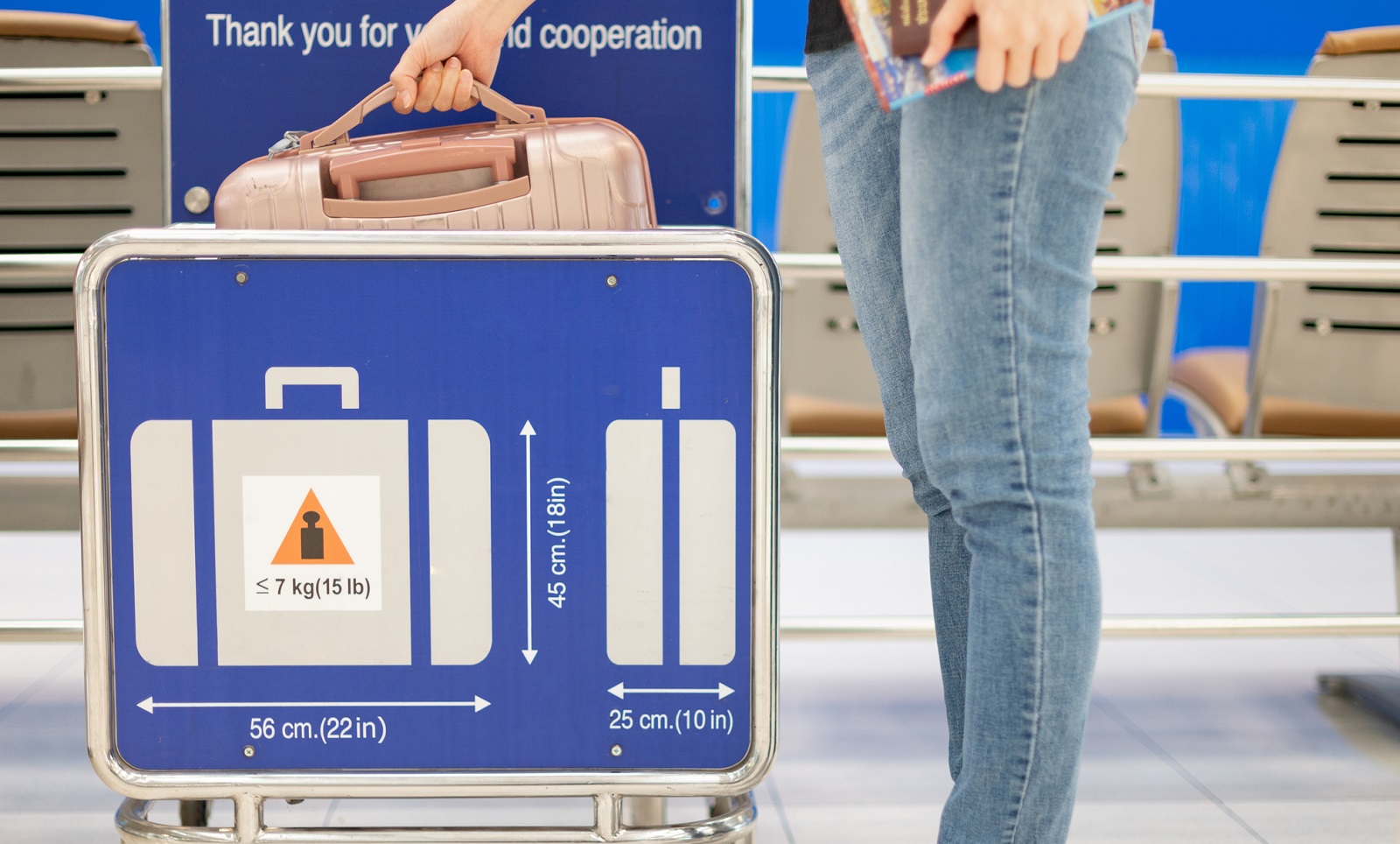JetBlue Follows American Airlines in Raising Checked Bag Fees
The airline said the increase will help cover a rise in costs of transporting bags.


Profit and prosper with the best of Kiplinger's advice on investing, taxes, retirement, personal finance and much more. Delivered daily. Enter your email in the box and click Sign Me Up.
You are now subscribed
Your newsletter sign-up was successful
Want to add more newsletters?

Delivered daily
Kiplinger Today
Profit and prosper with the best of Kiplinger's advice on investing, taxes, retirement, personal finance and much more delivered daily. Smart money moves start here.

Sent five days a week
Kiplinger A Step Ahead
Get practical help to make better financial decisions in your everyday life, from spending to savings on top deals.

Delivered daily
Kiplinger Closing Bell
Get today's biggest financial and investing headlines delivered to your inbox every day the U.S. stock market is open.

Sent twice a week
Kiplinger Adviser Intel
Financial pros across the country share best practices and fresh tactics to preserve and grow your wealth.

Delivered weekly
Kiplinger Tax Tips
Trim your federal and state tax bills with practical tax-planning and tax-cutting strategies.

Sent twice a week
Kiplinger Retirement Tips
Your twice-a-week guide to planning and enjoying a financially secure and richly rewarding retirement

Sent bimonthly.
Kiplinger Adviser Angle
Insights for advisers, wealth managers and other financial professionals.

Sent twice a week
Kiplinger Investing Weekly
Your twice-a-week roundup of promising stocks, funds, companies and industries you should consider, ones you should avoid, and why.

Sent weekly for six weeks
Kiplinger Invest for Retirement
Your step-by-step six-part series on how to invest for retirement, from devising a successful strategy to exactly which investments to choose.
Just one day after American Airlines announced it is raising checked baggage fees for the first time since 2018, JetBlue is coming under fire for doing the same thing — only more quietly via a post on its website.
First reported by travel site The Points Guy, JetBlue recently updated its website with the new bag fee structure.
For flights booked more than 24 hours before departure, the airline will now charge $35 for the first checked bag on flights within Canada, the Caribbean, Latin America and the U.S., and $50 for a second. You can expect to be charged $125 for a third checked bag and $150 for a fourth. (For a full list of fees and stipulations, visit the website.)
From just $107.88 $24.99 for Kiplinger Personal Finance
Become a smarter, better informed investor. Subscribe from just $107.88 $24.99, plus get up to 4 Special Issues

Sign up for Kiplinger’s Free Newsletters
Profit and prosper with the best of expert advice on investing, taxes, retirement, personal finance and more - straight to your e-mail.
Profit and prosper with the best of expert advice - straight to your e-mail.
JetBlue attributes the price hike to inflation, including increased costs and attempts to recoup profits following the COVID-19 pandemic.
"The cost of doing business has gone up significantly due to increased wages, higher fuel costs and other inflationary pressure, and we remain unprofitable since COVID," JetBlue said in a statement. "While we don’t like increasing fees, it’s one step we are taking to return our company back to profitability and cover the increased costs of transporting bags."
The airline said that customers should not need to choose between a low fare and a great experience. "By adjusting fees for added services that only certain customers use, we can keep base fares low and ensure customer favorites like seatback TVs and high-speed Wi-Fi remain free for everyone," it added.
JetBlue also noted that one checked bag remains free for JetBlue Plus card holders, and two checked bags continue to be free for Mosaic customers.
Spring travel prices fall
Despite the fact that at least two airlines are now charging you more to check your luggage, you may be able to save on a slew of airfares if you're traveling this spring.
According to a February 13 Spring Break Travel Outlook report on travel booking website Hopper, round-trip airfares for domestic travel in March and April are about $256 per ticket on average. That's a 2% decrease from the same time last year and an 11% dip from 2019 prices, Hopper says.
The report shows, in fact, that airfare is down from last year for numerous getaways including the Antilles, Caribbean, Mexico and Central America. March and April flights to Europe are 7% lower than they were a year ago as well, according to the report.
In addition, if you're looking for a budget-friendly, last-minute vacation, there are ways to save, such as opting to travel off-season or booking a package deal.
And if you really want to save money on baggage, some bargains are still available. Southwest Airlines , for example, will still allow you to check your first and second bag for free (at least, for now).
RELATED CONTENT
Profit and prosper with the best of Kiplinger's advice on investing, taxes, retirement, personal finance and much more. Delivered daily. Enter your email in the box and click Sign Me Up.

Jamie Feldman is a journalist, essayist and content creator. After building a byline as a lifestyle editor for HuffPost, her articles and editorials have since appeared in Cosmopolitan, Betches, Nylon, Bustle, Parade, and Well+Good. Her journey out of credit card debt, which she chronicles on TikTok, has amassed a loyal social media following. Her story has been featured in Fortune, Business Insider and on The Today Show, NBC Nightly News, CBS News, and NPR. She is currently producing a podcast on the same topic and living in Brooklyn, New York.
-
 Dow Adds 1,206 Points to Top 50,000: Stock Market Today
Dow Adds 1,206 Points to Top 50,000: Stock Market TodayThe S&P 500 and Nasdaq also had strong finishes to a volatile week, with beaten-down tech stocks outperforming.
-
 Ask the Tax Editor: Federal Income Tax Deductions
Ask the Tax Editor: Federal Income Tax DeductionsAsk the Editor In this week's Ask the Editor Q&A, Joy Taylor answers questions on federal income tax deductions
-
 States With No-Fault Car Insurance Laws (and How No-Fault Car Insurance Works)
States With No-Fault Car Insurance Laws (and How No-Fault Car Insurance Works)A breakdown of the confusing rules around no-fault car insurance in every state where it exists.
-
 No-Fault Car Insurance States and What Drivers Need to Know
No-Fault Car Insurance States and What Drivers Need to KnowA breakdown of the confusing rules around no-fault car insurance in every state where it exists.
-
 7 Frugal Habits to Keep Even When You're Rich
7 Frugal Habits to Keep Even When You're RichSome frugal habits are worth it, no matter what tax bracket you're in.
-
 How Much It Costs to Host a Super Bowl Party in 2026
How Much It Costs to Host a Super Bowl Party in 2026Hosting a Super Bowl party in 2026 could cost you. Here's a breakdown of food, drink and entertainment costs — plus ways to save.
-
 3 Reasons to Use a 5-Year CD As You Approach Retirement
3 Reasons to Use a 5-Year CD As You Approach RetirementA five-year CD can help you reach other milestones as you approach retirement.
-
 How to Watch the 2026 Winter Olympics Without Overpaying
How to Watch the 2026 Winter Olympics Without OverpayingHere’s how to stream the 2026 Winter Olympics live, including low-cost viewing options, Peacock access and ways to catch your favorite athletes and events from anywhere.
-
 Here’s How to Stream the Super Bowl for Less
Here’s How to Stream the Super Bowl for LessWe'll show you the least expensive ways to stream football's biggest event.
-
 The Cost of Leaving Your Money in a Low-Rate Account
The Cost of Leaving Your Money in a Low-Rate AccountWhy parking your cash in low-yield accounts could be costing you, and smarter alternatives that preserve liquidity while boosting returns.
-
 This Is How You Can Land a Job You'll Love
This Is How You Can Land a Job You'll Love"Work How You Are Wired" leads job seekers on a journey of self-discovery that could help them snag the job of their dreams.